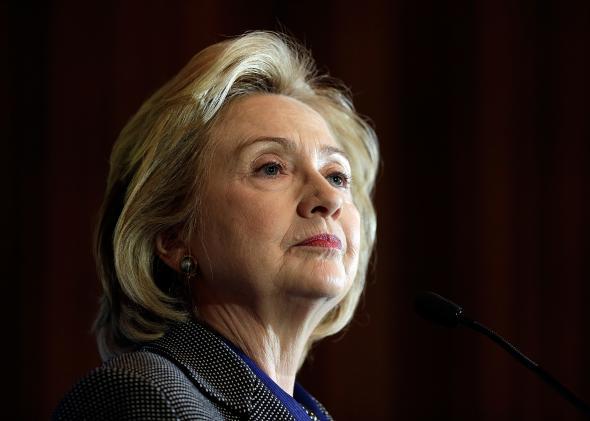Hillary Clinton’s LGBTQ supporters desperately want her to be a gay rights icon—or at least a staunch advocate for the community. But given that Clinton is emphatically not a gay rights icon, or even a particularly steadfast ally, this desire has led to some awkward cognitive dissonance. Her apparent position on gay marriage—leave it to the states—is about as progressive as Dick Cheney’s circa 2004. (It’s also constitutionally incoherent.) Her biggest gay rights achievement to date is a single speech that doesn’t mention marriage. In fact, until 2013, Clinton’s public views on marriage equality seemed to be about the same as Brendan Eich’s.
This mixed record—further blackened, fairly or not, by her association with the man who signed DOMA—is theoretically forgivable. But Clinton has done almost nothing to encourage the LGBTQ community to forgive her. Her gay marriage metamorphosis in 2013—which the Economist dubbed a “farcically late conversion”—arrived with no attendant mea culpa for her decades of misjudgment. Nor were any such apologies to follow. And when NPR’s Terry Gross gently prodded Clinton for an explanation of her evolution in June, Clinton clumsily dodged and wriggled, turning a softball into a painful PR calamity. (In an extraordinary case of scrambled allegiances, some conservatives actually defended Clinton’s evasion.)
Why won’t Clinton just say she’s sorry and join her fellow Democrats in supporting a constitutional right to marriage? The usual things, probably: baggage and ego. Thanks to her husband’s support of anti-gay legislation, Clinton has a much thornier history with gay rights than do most Democratic politicians; she simply has more to apologize for than most of her liberal colleagues. But Vice President Joe Biden, who has a similarly checkered history on LGBTQ issues, has managed to avoid embarrassment by coming out swinging—at times a bit too hard—for gay rights. Biden smartly credited his own evolution to his exposure to loving gay families, a pitch he sells with charismatic mushiness. Clinton, on the other hand, has yet to settle on a narrative to explain her switch. And without one, the decision seems too tardy and lukewarm to be anything but a bald political maneuver.
There is, of course, a way for politicians to contend with their previous opposition to gay rights without painting their past selves as irredeemable bigots. Openly gay Maine congressman and gubernatorial candidate Mike Michaud recently explained his past anti-gay votes to me by describing the toxic environment of the 80s and his own misunderstanding of social progress. (I detected sincerity; my commenters were more skeptical.) A number of congresspeople who voted DOMA into law filed an amicus brief encouraging the Supreme Court to overturn the law; Reason intimated hypocrisy, but a legal brief speaks much louder than a blustering press release.
Clinton, who blandly insists that she has “evolved” on marriage without explaining how, hasn’t tried any of these approaches. Given how genuinely caught off guard she was by Gross’ interrogation, Clinton seems to think she could glide along with the gay rights movement on its path to triumph. Between now and 2016, however, she may find that her past indifference to the LGBTQ movement cannot be overwritten by a platitude and a sound bite. Liberals have many reasons to admire Clinton, but a commitment to gay rights is not yet one of them. And until she’s comfortable speaking the language of equality, Clinton will remain stuck in her current purgatory of undue defensiveness and evasive nonsense.
